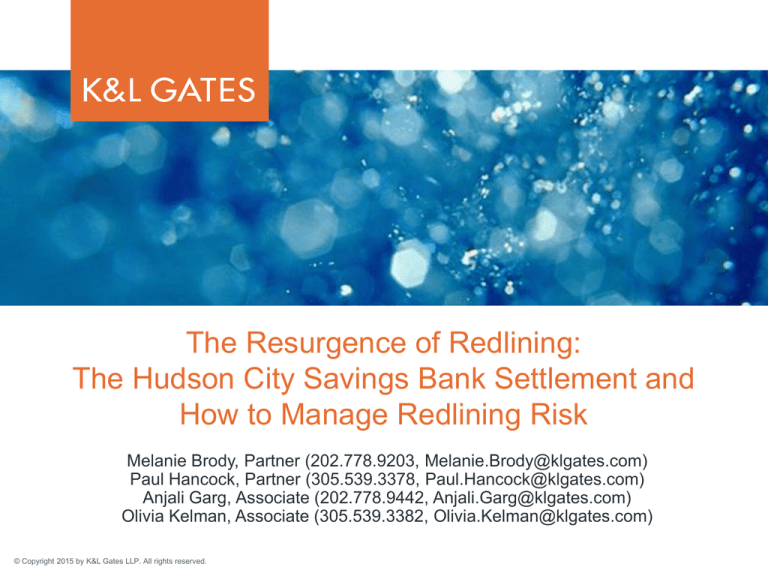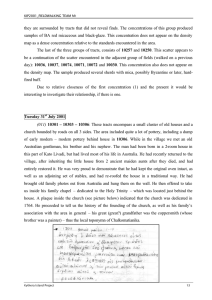
The Resurgence of Redlining:
The Hudson City Savings Bank Settlement and
How to Manage Redlining Risk
Melanie Brody, Partner (202.778.9203, Melanie.Brody@klgates.com)
Paul Hancock, Partner (305.539.3378, Paul.Hancock@klgates.com)
Anjali Garg, Associate (202.778.9442, Anjali.Garg@klgates.com)
Olivia Kelman, Associate (305.539.3382, Olivia.Kelman@klgates.com)
© Copyright 2015 by K&L Gates LLP. All rights reserved.
Background
BACKGROUND
Redlining in the fair lending context refers to the practice of denying
financial services—usually residential mortgage loans—to residents of
certain geographic areas based on the racial or ethnic makeups of those
areas:
“[D]eclaring black areas off-limits for mortgage lending [is] a practice otherwise
known as redlining.” Press Release, U.S. Department of Justice, “Justice
Department Obtains Unprecedented Settlement from D.C. Area Bank [i.e., Chevy
Chase] for Allegedly Failing to Service Predominantly Black Areas,” (Aug. 22,
1994).
Historically, red lines were allegedly drawn on maps to indicate
neighborhoods in which companies would refuse to do business.
3
BACKGROUND
Although the Supreme Court has recognized the application of disparate
impact under the Fair Housing Act, the legal theory is not necessarily
applicable to all types of claims:
“[The Fair Housing Act] covers a variety of practices … . Some practices lend
themselves to the disparate impact method, others not.” Village of Bellwood v.
Dwivedi, 895 F.2d 1521, 1533 (7th Cir. 1990).
Dwivedi held that proof of intent (i.e., disparate treatment) was necessary to
show a “steering” violation of the Fair Housing Act.
Under that same logic, intent would be required to prove a redlining violation.
Federal enforcement agencies seem to suggest that redlining could be
pursued under a disparate impact theory, although they often merge the
concepts in pleadings.
4
BACKGROUND
Currently, the term “redlining” is applied much more broadly:
The term usually refers to when a lender is statistically shown to have made a
smaller proportion of its loans in predominately minority census tracts as
compared to non-minority census tracts within the same Metropolitan Statistical
Area (“MSA”), as compared to its peer lenders.
Now the focus is on whether the lender lends “equally” in minority and nonminority geographies.
To date, redlining enforcement has focused exclusively on depository
institutions due to their Community Reinvestment Act obligations.
Has the assessment area been drawn in a fair and nondiscriminatory
manner?
DOJ has frequently contended that a lender’s assessment area should be larger.
Has the lender properly served minority areas of the assessment area?
5
BACKGROUND, CONT.
The CFPB now conducts redlining examinations and investigations
on non-depository institutions and has indicated that it expects such
institutions to monitor their lending for potential redlining risk.
CFPB Annual Fair Lending Report (April 28, 2015):
“The Bureau had a number of ongoing investigations and
authorized lawsuits against institutions that are focused on fair
lending. In particular, the Bureau focused its efforts on
addressing redlining. . . At the end of 2014, the Bureau had
several open investigations of potential redlining.”
The CFPB has also suggested that it may evaluate non-mortgage
products for potential redlining.
6
Recent Redlining Settlements
RECENT SETTLEMENTS
Three recent redlining settlements illustrate the resurgence of
redlining enforcement:
United States Department of Housing and Urban Development v.
Associated Bank, N.A., Complaint No. 00-12-003-8 (May 26, 2015)
Chicago, IL; Milwaukee, WI; Lake-County-Kenosha County, IL-WI areas
HUD-initiated complaint
Consumer Financial Protection Bureau and United States v. Hudson
City Savings Bank, F.S.B. (D.N.J.) (Sept. 24, 2015)
NY/NJ MSA; Camden MSA; and Bridgeport, CT MSA
CFPB referral
United States v. Eagle Bank and Trust Company of Missouri, 4:15-cv01492 (E.D. Mo.) (Sept. 29, 2015)
St. Louis, MO metropolitan area
FDIC referral
8
STATISTICAL ALLEGATIONS
Associated Bank
Hudson City
Eagle Bank
“Compared to
other lenders,
[Associated Bank’s]
lending in majorityminority census
tracts was lower
than in other
neighborhoods, and
the difference was
statistically
significant.”
“Analysis of Hudson City’s
mortgage applications…as
compared to its peers
showed disparities in lending
to majority-Black-and-Hispanic
neighborhoods between
Hudson City and its peers.
These disparities are
statistically significant and
show that there were
applicants seeking mortgage
loans in majority-Black-andHispanic areas in these
MSAs.”
“Statistical analyses of the
[Bank’s] residential real estaterelated loan applications and
originations for each year from
2006 to 2012, show that the
defendant served the credit needs
of the residents of majority-white
census tracts in the Missouri
portion of the St. Louis MSA to a
significantly greater extent than it
served the residential real estaterelated credit needs of the
residents of majority-black census
tracts. During that time, there
were statistically significant
disparities with respect the
defendant’s residential real estate
lending activity when compared
with similar lenders.”
9
STATISTICAL ALLEGATIONS, CONT.
Hudson City: Peer Example
Eagle Bank: Peer Example
0.1% of loan applications came from
high-Black-and-Hispanic areas in the
Camden MSA compared to 4.4% for
the Bank’s peers (44 times as many).
1.9% of loan applications were related to
residential properties located in majorityBlack census tracts in the St. Louis MSA.
During the same time period, comparable
lenders generated 11.1% of their
applications from majority-Black Census
tracts (five times as many).
10
QUALITATIVE ALLEGATIONS
Hudson City
Eagle Bank
Branch and broker locations:
• Branches located outside of majorityBlack-and-Hispanic areas
• Accepted mortgage loan applications
outside of and not in proximity to
majority-Black-and-Hispanic areas
• None of the Bank’s 7 retail loan officers
are Black or Hispanic or can speak
Spanish
• Heavily concentrated broker network
outside of majority-Black-and-Hispanic
areas (94.5% of top 50 brokers)
Locations:
• All 12 of the Bank’s full-service
branches in the St. Louis area are
located in majority-white census tracts
• Of the 17 bank offices, 14 are in
census tracts with a minority
population of less than 10%; one
limited-service facility is in a census
with a minority population of 10 to less
than 20%; and one full-service and
one limited-service facility are in
census tracts with a minority
population of 20 to less than 50%
Exclusion of majority-Black-and-Hispanic
neighborhoods from CRA assessment areas
Exclusion of majority-Black census tracts
from CRA assessment areas
Exclusion of majority-Black-and-Hispanic
neighborhoods from the Bank’s limited
marketing efforts
Failure to market mortgage lending
services to Black borrowers or in
majority-Black census tracts
11
QUALITATIVE ALLEGATIONS, CONT.
Hudson City
Eagle Bank
Failure to monitor for redlining despite the
CFPB’s 2012 recommendation to do so
N/A
Failure to hire sufficient staff to ensure
compliance with its fair lending obligations
N/A
12
SETTLEMENTS: FINANCIAL TERMS
Associated Bank
Hudson City
Eagle Bank
No civil money penalty
$5.5 million civil money penalty
to the CFPB
No civil money penalty
$9.54 million in subsidies for
qualified loan applicants in
certain majority-minority
census tracts
$25 million in loan subsidies to
qualified applicants in majorityBlack-and-Hispanic
neighborhoods (up to $18,750
per individual applicant)
$800,000 in loan
subsidies for home
mortgage or small
business loans (up to
$20,000)
Originate, fund, or purchase
$190.8 million in mortgage
loans in certain majorityminority census tracts
N/A
N/A
$3 million in affordable
home repair grants
N/A
N/A
N/A
$750,000 on community
development partnership
programs
N/A
13
SETTLEMENTS: FINANCIAL TERMS CONT.
Associated Bank
Hudson City
Eagle Bank
$1.4 million in
affirmative
marketing and
outreach
$200,000 per year on
targeted advertising and
outreach, including at least
two print media, radio
advertisements on two radio
stations, point of distribution
materials, and direct
mailings directed to African
American and Hispanic
consumers and quarterly
outreach programs
$25,000 per year on targeted
advertising and marketing, including
one print media, two radio stations,
point of distribution materials, and
direct mailings targeted toward
majority-African-American census
tracts and quarterly outreach
programs
$1.35 million for
CRA training and
education
$100,000 per year on
consumer financial
education programs
$18,750 per year on consumer
financial education and credit repair
programs (including HUD-approved
financial education counselors,
special purpose checking accounts,
or debt forgiveness)
14
SETTLEMENTS: PROSPECTIVE RELIEF
Associated Bank
Hudson City
Eagle Bank
Open four loan production
offices in certain majorityminority census tracts within
30 months of the Agreement
Open or acquire two new
full-service branches within
majority-Black-and-Hispanic
neighborhoods in retailoriented spaces in visible
locations within 18 and 30
months, respectively
Open two new branches
within 18 months (one
already scheduled to open
at the end of 2015)
Fair lending training
Fair lending training
Fair lending training
Second-level review policy
for denied applications
N/A
N/A
Financial education
programs
Sponsor a minimum of 12
financial education events
per year
Sponsor a minimum of 12
financial education events
per year
15
SETTLEMENTS: PROSPECTIVE RELIEF
Hudson City
Eagle Bank
Compliance plan, including policies and
procedures to select and oversee brokers
to address redlining risk and statistical
monitoring for redlining risk including peer
analysis of applications and originations
from majority-Black-and-Hispanic
neighborhoods
N/A
Revise CRA assessment areas to include
specified locations
Modify CRA assessment area to include
specified locations (already completed in
2013)
Credit needs assessment of majority-Black- Credit needs assessment of majorityand-Hispanic neighborhoods
African-American census tracts
Hire or designate a full-time Director of
Community Lending
Designate a full-time Director of Community
Development
Ensure that existing branches in majorityBlack-and-Hispanic neighborhoods accept
mortgage loan applications
N/A
16
SETTLEMENTS: PROSPECTIVE RELIEF
Hudson City
Eagle Bank
Ensure that at least 8% (or three) loan
officers are assigned to serve branches
and loan production offices in majorityBlack-and-Hispanic neighborhoods
N/A
Develop a community development
partnership program to provide credit,
financial, homeownership, small business,
and/or foreclosure prevention services to
the residents of majority-African-American
census tracts
17
Recommendations
EVALUATING REDLINING RISK
Using recent settlements as a guide, lenders should consider
evaluating their redlining risk using both qualitative and statistical
metrics.
Qualitative metrics could include:
CRA assessment area
Branch locations
Geographic focus of advertising and marketing efforts
Communities served by brokers
Racial/ethnic diversity in sales force
19
REDLINING MONITORING
Goal of redlining testing is to identify geographies in which the Target
Lender may be viewed as underserving residents of majority minority
census tracts, as compared to its “peer” lenders.
Unlike other types of fair lending testing (e.g., underwriting and
pricing), there is neither a commonly-accepted analytical approach nor
a generally-accepted standard for concluding whether a particular
lender’s activity presents legal risk.
Therefore, lenders should consider using redlining testing results as a
tool for identifying geographies in which they might consider
prioritizing minority-area lending outreach efforts, as opposed to a
basis for concluding whether they have violated the Fair Housing Act
and/or Equal Credit Opportunity Act.
20
REDLINING MONITORING, CONT.
To perform redlining testing, statisticians use Home Mortgage
Disclosure Act (“HMDA”) data to compare the Target Lender’s loan
application and origination activity to that of its peer lenders.
HMDA data becomes publicly available in September or October of
the calendar year following the year in which the lending activity
occurred.
2014 HMDA data has been released.
Statisticians therefore can perform redlining testing on a Target
Lender’s 2014 lending activity, as compared to its peers’ 2014 lending
activity.
21
REDLINING MONITORING, CONT.
There are numerous analytical approaches for performing redlining
tests—there is no “gold standard.” Two commonly used ones are:
Comparative (proportional) distribution: compares the Target Lender to peer
lenders in the overall market, based on the percentage distribution of each lender’s
loans between high-minority (>=75% minority) and low-minority (<=25% minority)
census tracts.
Market share: compares the Target Lender’s market shares in high-minority and
low-minority census tracts as compared to its peer lenders’ market shares.
But lenders also may want to consider loan volume distribution, which
compares the Target Lender’s loan application and/or origination unit
volumes in majority-minority neighborhoods with that of other peer
lenders in majority-minority neighborhoods.
22
REDLINING MONITORING, CONT.
Testing:
Testing is usually performed only on MSAs in which the Target Lender has
a certain minimum volume of loans (e.g., the lender made at least 100
loans in the year being reviewed).
At a minimum, define peer lenders as those lenders that had an
origination volume in the applicable market with 50%—200% of the target
lender’s lending volume.
The testing features described above are “conservative,” meaning that
we did not use testing methods (e.g., more granularly defining peers)
that may improve the overall results.
For example, if the Target Lender does not make FHA loans, it may be
appropriate to exclude lenders with a large percentage of FHA loans
from the peer list.
23
REDLINING MONITORING, CONT.
Sample Results:
The following chart presents hypothetical results for a Hypothetical MSA.
In the Hypothetical MSA:
Target Lender made a total of 500 loans. 20% of them were in high-minority
tracts and15% of these loans were in low-minority census tracts.
The ratio of Target Lender’s high-minority share to low-minority share is 1.33
(20/15 = 1.33).
In comparison, all of Target Lender’s peer lenders combined made a total of
50,000 loans. 15% of these loans were in high-minority census tracts, and
19% of them were in low-minority tracts.
The ratio of all peer lenders high-minority share to low-minority share is 0.79
(15/19 = 0.79).
This means the target lender had 1.33 times as much lending in high-minority
tracts as in low-minority tracts, whereas its peers had only 0.79 times as much
lending in high-minority tracts as in low-minority tracts.
In other words, Target Lender out-performed its peers in its rate of lending in
high-minority tracts.
24
Defending Redlining Claims
DEFENDING REDLINING CLAIMS
Does redlining require proof of intentional discrimination? Can proof
of a disparate impact establish liability for redlining?
“Redlining” by definition envisions intentional discrimination, but
enforcement agencies appear to contend that redlining claims can
be brought under a disparate-impact legal theory.
The definition of redlining has evolved, and at present, it appears the
government’s focus is on equality of outcomes between minority and
non-minority communities.
The government’s approach to redlining claims:
The initial focus is on whether an institution has fairly drawn its
assessment area.
The question becomes whether the institution is meeting the credit
needs of all segments of the community that it serves.
26
DEFENDING REDLINING CLAIMS
An institution facing a redlining claim should defend its assessment
area.
Data necessary to perform a redlining analysis is not complex, but
careful thought is required in order to select the appropriate data,
peers, and analytical methodology to provide a fair evaluation of a
lender’s performance.
The Community Reinvestment Act does not always impose an
obligation that requires an institution to serve the entire MSA in
which it operates.
27
DEFENDING REDLINING CLAIMS
Institutions should carefully examine the “peer” question, and should
consider how their “peers” can appropriately be defined.
For example, community banks might appropriately be compared to
other community banks.
Carefully consider the products offered by other lenders in selecting
peers:
Compare performance by product, if appropriate.
Peer review is necessarily a rear-view mirror analysis because
HMDA data is not made available until the following year.
28
DEFENDING REDLINING CLAIMS
Can “niche” lenders be liable for redlining?
Non-FHA lenders arguably should be compared to other non-FHA
lenders.
“Provided the lender did not adopt its ‘niche’ under circumstances
from which a discriminatory purpose could fairly be inferred, and that
the lender’s ‘niche’ marketing is consistently applied, I would not
generally expect the Department [of Justice] to prosecute on the
basis of such ‘niche’ lending practices.” Letter from Deval L. Patrick,
Assistant Attorney General, U.S. Dept. of Justice, “Department of
Justice Fair Lending Enforcement Program,” (Feb. 21, 1994).
Query whether the current administration would agree with these views.
29
DEFENDING REDLINING CLAIMS
Institutions should consider alternate methods of performing
redlining analyses:
Consider performing a loan volume distribution analysis.
Consider performing an analysis segmented by product.
Consider segmenting a redlining analysis to more accurately answer
the question of whether an institution is helping to meet the credit
needs of all communities in its assessment area.
30
DEFENDING REDLINING CLAIMS
Federal agencies have pushed the concept of “redlining” far beyond
its original limits.
In many respects, “redlining” claims have simply become a demand
for racial and ethnic quotas.
Under a proportional distribution analysis, a large percentage of
lenders always are subject to claims of alleged “redlining.”
Approximately half of lenders will necessarily perform worse than the
average.
Query whether a court would accept this approach.
At some point, industry members may need to challenge the
government’s approach.
31





